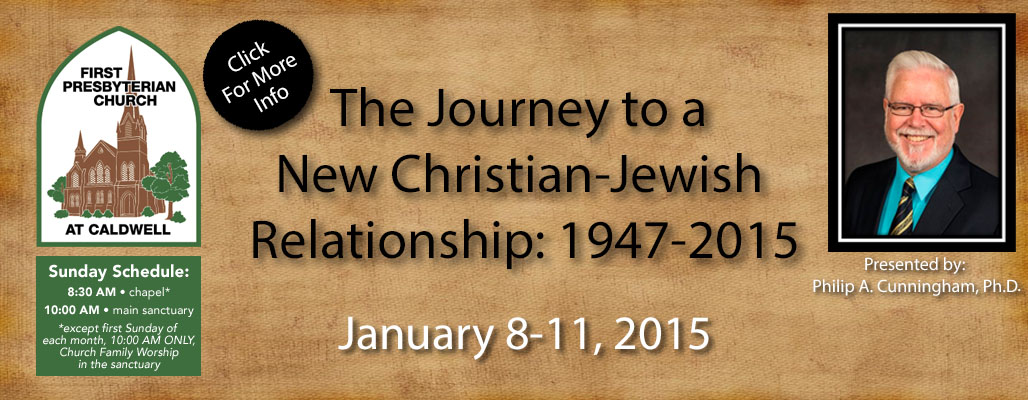INTERFAITH SPEAKER SERIES: The Journey to a New Christian-Jewish Relationship: 1947-2015
The Journey to a New Christian-Jewish Relationship: 1947-2015
Presented by: Philip A. Cunningham, Ph.D.
January 8-11, 2015
This series will survey the origins and development of the new relationship between the Jewish and Christian communities that began to unfold in the aftermath of the Shoah. It will consider the sea change that occurred in Christian self-understanding, the impact in both communities of new ways of reading the scriptures, challenges in beginning and deepening dialogue, and hopes for a future of collaboration and mutual enrichment.
1) Thursday evening, January 8, 2015 at 7:30pm at St. Peter’s Episcopal Church
“The Journey to a New Christian-Jewish Relationship: 1947-2015”
This program introduces the series by exploring the key reforms in Christian thought demanded by the atrocity of the Holocaust. Though a need for dialogue between Jews and Christians was seen by many, the effort encountered many challenges and controversies over the years. Nonetheless, with patience and perseverance an unprecedented degree of positive interaction has occurred, leading to open and respectful conversations between Christians and Jews on profound religious topics.
2) Friday evening, Jan 9, 2015 at 7:30pm at First Presbyterian Church
“The Apostle Paul: Jewish Apostate or Jewish Apostle?”
The figure of Paul of Tarsus, to whom thirteen New Testament books are attributed, has proven to be pivotal in the growth of contemporary Christian and Jewish rapprochement. Once seen as the individual most responsible for negative church attitudes toward Judaism and the Torah, recent scholarship is instead viewing him as a Pharisee who remained Torah observant all his life but who became enthusiastic that God was in the process of inaugurating the Age to Come. The implications of this new Pauline portrait for relations between Christians and Jews in our very different religious world of today will also be discussed.
3) Saturday morning, Jan 10, 2015 at 11:30am at Congregation Agudath Israel
“The Tanakh and the Christian Bible: Battle Ground or Meeting Ground?”
For centuries, conversations between Christians and Jews about the scriptures – usually initiated by Christians for conversionary purposes – often became polemical disputations. For various reasons that this presentation will examine, this is no longer the case. Today Jewish and Christian scholars collaborate in studying important biblical, historical, and archaeological subjects, leading to crucial insights into the formation of both Christianity and Rabbinic Judaism. This emerging understanding of our origins opens up new possibilities for mutual interreligious enrichment today.
4) Saturday evening, Jan 10, 2015 at 7:30pm at First Presbyterian Church
“The State of Israel and Jewish-Christians Relations”
The establishment in 1948 of a modern nation-state called Israel as a homeland for Jews generated theological challenges for both Christians and Jews. For example, Christians had to grapple with a legacy that saw Jewish landlessness as validating Christian truths, while Jews struggled with whether a Jewish state should exist in pre-messianic times. Persistent geopolitical turmoil, often manipulated by superpower rivalries, made interreligious conversation about these matters very difficult – a reality that continues today. This presentation is not about “solving” the various Middle East conflicts. Instead it will explore why Jews and Christians all over the world find these topics so challenging to discuss and suggest approaches for constructive dialogue.
5) Sunday afternoon, Jan 11, 2015 at 2:30pm at Notre Dame Catholic Church
“Pope Francis and Rabbi Abraham Skorka: A New Phase of the Christian and Jewish Relationship?”
Among several historic firsts, the election of Cardinal Jorge Bergoglio brought to the papacy the first pontiff to have enjoyed regular theological dialogue with close Jewish friends. This experience has powerfully shaped Pope Francis’ writings on the subject of Christian-Jewish relations, which suggest that the “new relationship” may be entering a new and exciting period of mutual enrichment. It will propose that the deepening relationship could be understood as resembling a traditional Jewish practice called chavruta: the close study of religious traditions with a study partner.
